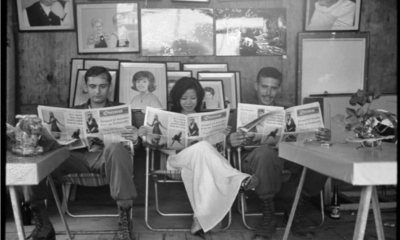(Logo of “Vietnamese-Americans for Biden”. Source: Viets4Biden)
Anna Nguyen
Vietnamese Americans Mobilize for Biden (part 2)
As fundamental as they are to the existence of our democracy, elections in the United States are frequently tinged with the stain of scandal and often become the focal point for bitter party politics. This upcoming presidential election does not seem to deviate from that norm. With less than a month to go until Election Day, both campaigns are working tirelessly with local community organizations to push their candidate to the forefront of a discussion about national politics.
One community organization currently attempting to solidify its impact on the Asian community is “Vietnamese Americans for Biden”. Also stylized as Viets4Biden, this group defines themselves as “an affiliate group working to organize the Vietnamese-American community to elect the Biden-Harris ticket.” On September 3, 2020, members from the Viets4Biden team hosted their virtual launch event to an audience of over 250 attendees. The main goal for this campaign kickoff appeared to be the mobilization of Vietnamese-American voters, as well as other Asian-American participants who identified with the immigrant experience. Although I was unable to view all of the attendees participating in the meeting, its target audience seems to consist of young Vietnamese-Americans interested but uninformed about the electoral process. Event host Binh Ly catered to this diverse set of webinar participants by introducing younger and older members of the organization who then disseminated information in a bilingual manner.
This event was framed as an opportunity for Vietnamese and Vietnamese-Americans situated all over the United States to come together and rally for both members on the Democratic presidential ticket. A significant amount of the programming was also devoted to voter information, registration, and mobilization, in addition to donation requests on behalf of former Vice President Joe Biden’s campaign. Prominent political leaders within the Asian-American community like U.S. Representative Stephanie Murphy (FL-07), Michelle Kwan, and Washington State Representative My-Linh Thai also appeared to articulate their endorsement of Vice President Biden and Senator Kamala Harris. In her keynote remarks, Congresswoman Murphy contextualized her political journey by framing it through the lens of a refugee. She then juxtaposed her experiences as an American immigrant with President Trump’s ardent anti-immigrant rhetoric and argued that Vietnamese-Americans should vote for a leader — Vice President Biden — that will advocate for their interests as migrants to this country. Rep. Murphy also addressed President Trump’s mismanagement of the COVID-19 pandemic and emphasized that ending his reign of power is imperative at this moment in time.
Rep. Murphy’s remarks set the tone for the rest of the evening, as many of the subsequent speakers echoed her sentiments in their own calls to action. Former Olympic medalist and figure skater Michelle Kwan commented on the tenacity of the Asian-American community while again making note of the Vietnamese-American immigrant experience. Kwan ultimately ended her speech with a hopeful message to the event attendees: “As Asian-Americans, we can be the margin of victory. So we should be.” Washington State Representative My-Linh Thai spoke next as a preface to the brief roundtable discussion she moderated with four other Vietnamese-American politicians in attendance at the event. Conversation topics during this segment ranged from public housing, education, and other ways these men and women have given back to their constituents as immigrants or descendants of immigrants. Tram Nguyen, a state representative from Massachusetts, commented that the existence of the panel is a significant accomplishment in and of itself because it demonstrates the power of Vietnamese-American representation on both a federal and local level. This discussion is catered towards and appeals directly to the event’s younger audience and implies that the victories achieved thus far by these legislators have paved the way for more passionate Vietnamese minds to enter the realm of politics.
Throughout this entire virtual experience, one theme shone through as the focal point for each and every conversation: immigration. The Vietnamese refugee experience seemed to be a general area of common ground for all event participants, and this angle worked well for a while until questions about the future were brought to the table. Discussions about young Vietnamese-Americans and their impact on the scope of electoral politics are now more difficult to navigate when we consider the fact that not everyone in the Vietnamese voter base is a first-generation immigrant. Framing arguments of opposition against President Trump need to encompass anti-immigration but also extend beyond those parameters because focusing on only the former minimizes the lived experiences of second and third-generation Vietnamese communities in America.
Many of the guest speakers leaned into this immigration-oriented strategy during the event through their allusions to the American Dream. With triumphant stories of immense sacrifice under the classic “rags to riches” narrative, it’s not hard to see why Vietnamese patriotism for their new home country is so compelling. Rep. Murphy even mentioned that her story would have happened “only in America,” which perpetuated a certain image of the United States as an economic and political superpower teeming with wealth, resources, and opportunity for the immigrants who seek it. This ardent devotion towards America as the land of the free and home of the brave is inherently problematic because it minimizes the struggles of impoverished communities of color in addition to the diversity of culture and language within the Asian-American demographic. These communities are not monolithic, so a more comprehensive approach to their involvement in the democratic process is needed to compensate for those differences.
Although the diasporic Vietnamese community prides itself on establishing collective ethnic unity in the face of assimilation, they are by no means monolithic either. These disparities are seen most clearly in the division in political ideology between immigrant parents and their children. This generational gap transcends the parameters of race but tends to be most prevalent in the households of “new” 20th century immigrants in the Asian-American community.
More often than not, older Vietnamese are attracted to President Trump’s conservative positions and promises despite his mismanagement of the COVID-19 pandemic in addition to the public exacerbation of animosity toward Asian-Americans in its wake. Members of this conservative collective resonate with the President’s anti-Chinese rhetoric and subsequently become enraptured by his individualistic and America-oriented approach to politics. Younger Vietnamese-Americans, however, are more inclined to have more liberal political views than their elders and tend to reflect the general attitudes of Americans in the millennial age range.
Even though generational divides exist within the Vietnamese community, these kinds of differences are not entirely universal. The Viets4Biden event exemplifies such an exception as individuals from varied cultural backgrounds and experiences came together to mobilize support for a common political interest. Occurrences like this appear to be more common across the United States in recent months, which reveals a distinct yet underlying truth about how the Vietnamese understanding of politics has evolved over the years.
Asian-Americans are the fastest-growing racial group in terms of eligible voters,1 yet many individuals in this demographic abstain from voting despite these statistics. Rep. Stephanie Murphy dealt with this concern head-on in her keynote address as she urged young voters to elect the political candidates that support the issues their constituency stands for. Voting, she argued, was one of the many ways one could get involved and stay civically engaged as a Vietnamese-American. As a second-generation college student and Vietnamese-American attendee, I was quite surprised to see such a strong outpouring of support from older and younger folks at this Viets4Biden event.
Although American elections have progressively become more polarizing in recent years, the presence of older and younger Vietnamese at this event suggests that the generational divide may be exaggerated. Overall, the inaugural launch event was fairly successful in terms of mobilizing the Vietnamese vote and appears to be well-received from panelists and attendees alike. Although we may not know what the Vietnamese-American electorate will look like in the next ten years, one thing is for certain: the position of the Vietnamese-American community within the sphere of national politics is one of great promise and potential. We have the power to leave a lasting impact on the world, and that starts with our vote on the ballot this November.

 Politics & Economy4 years ago
Politics & Economy4 years ago
 Society & Culture5 years ago
Society & Culture5 years ago
 ARCHIVES5 years ago
ARCHIVES5 years ago
 Politics & Economy4 years ago
Politics & Economy4 years ago
 Politics & Economy1 year ago
Politics & Economy1 year ago
 Politics & Economy5 years ago
Politics & Economy5 years ago
 After 19751 year ago
After 19751 year ago
 Politics & Economy4 years ago
Politics & Economy4 years ago






